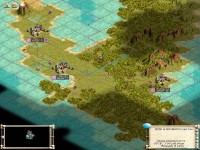|
|
|
...continued
Once
you locate a resource you'd like to claim for your
civilization, the next step is to actually go out
and get it. There are two ways to accomplish this:
via colonies or via Culture. Culture is a primary
element of the gameplay in Civilization III, as it
determines your empire's borders, helps eliminate
barbarians, and even influences other nations. In
simplest terms, Culture is a passive way to control
the map using nothing more than your civilization's
major and minor achievements. You expand your
Culture by building city improvements like temples,
libraries, and even Wonders. Each structure which
serves to improve your people's intellectual or
spiritual nature expands your Cultural influence
over the surrounding area and thus your borders. As
cities build these types of improvements, their
Culture totals will build up and eventually cause a
border expansion around the city; this also serves
to negate the fog of war on the game map. If a
resource is located within your borders, all you
need to do in order to claim it is build a road to
the resource. Should a resource reside outside of
your empire, you must have a Worker build a road
out to it, and then construct a colony on the
resource itself. If your borders ever expand over
the colony, the colony will vanish
automatically.
 Certainly,
there's not much point in acquiring strategic
resources unless you have something to use them
for, and this is where the Tech Tree comes into
play. Instead of creating a standard tree of
advances, Firaxis has broken Civilization III down
into four distinct eras: Ancient, Middle Ages,
Industrial and Modern. Each period defines what
advances you'll be able to research, what units
you'll be able to build, the Wonders available and
even how your civilization looks. In order to move
from period to period, you must research most --
but not all -- of the advances for that era. Should
you find yourself behind in research compared to
other civilizations, your science advisor will
bemoan that you rule a backward people; this is a
strong indication that it's time to take
action. Certainly,
there's not much point in acquiring strategic
resources unless you have something to use them
for, and this is where the Tech Tree comes into
play. Instead of creating a standard tree of
advances, Firaxis has broken Civilization III down
into four distinct eras: Ancient, Middle Ages,
Industrial and Modern. Each period defines what
advances you'll be able to research, what units
you'll be able to build, the Wonders available and
even how your civilization looks. In order to move
from period to period, you must research most --
but not all -- of the advances for that era. Should
you find yourself behind in research compared to
other civilizations, your science advisor will
bemoan that you rule a backward people; this is a
strong indication that it's time to take
action.
Unlike
in Civilization II, it's not possible to obtain
technology by invading and capturing opposing
cities. Given this, if you can't research something
yourself, but you need to keep up, your best option
is diplomacy. Diplomacy with other civilizations
has been given a good deal of attention by Firaxis,
and as a result, you'll find yourself trying to
work out deals fairly often. Reputation becomes of
great importance in Civilization III, as breaking
deals or declaring war without cause can have long
lasting repercussions to the game. It's in this way
that players must be more careful when making major
international decisions, instead of throwing
caution to the wind as was often possible in
Civilization II.
Through
the fine art of diplomacy, you can trade maps,
excess luxuries or strategic resources (assuming
you have a viable trade route), obtain
communications with civilizations you haven't met,
make both military and trade alliances, and much
more. In Civilization III, all deals last for 20
turns, with the exception of peace treaties which
last until war is declared. It is also through the
use of diplomatic embassies that Firaxis has
implemented Espionage. Rather than using a spy or
diplomat unit as in the past, players can now
accomplish underhanded tasks by establishing an
embassy in another civilization's capital. Once
done, for a modest fee of gold, you can attempt to
steal technology or find out about a particular
rival city. If you're caught, there could be dire
consequences -- including war -- but sometimes it's
worth the risk. Once your civilization discovers
Espionage you can plant a spy once you've built the
Minor Wonder, Intelligence Agency; you're given
even more options including: sabotaging production
in a city, starting a propaganda war to try and
sway a rival city to your cause, stealing the plans
for where the opposing civilization's military
units are located and more. All of these actions
come with a very high price, however, and so don't
typically play a very large role during a game.
Also, Firaxis has removed the option for spies to
plant nuclear bombs or bio-warfare agents in this
game, both of which were possible in Civilization
II.
 As
in the past, Wonders play a large part in
Civilization III, though sometimes mainly a
cultural one depending on your needs. Firaxis has
split these special structures into two types,
Greater and Minor Wonders, with the difference
being that Minor Wonders may be built by every
civilization whereas Greater Wonders can be built
only once and only by a single nation. The effects
of Wonders are, as always, quite significant due to
their individual effects on your civilization, plus
Wonders tend to generate a lot of Culture points.
Many of the Greater Wonders from Civilization II
make a reappearance here, with only the Minor
Wonders -- such as The Intelligence Agency and
Battlefield Medicine -- appearing for the first
time. As
in the past, Wonders play a large part in
Civilization III, though sometimes mainly a
cultural one depending on your needs. Firaxis has
split these special structures into two types,
Greater and Minor Wonders, with the difference
being that Minor Wonders may be built by every
civilization whereas Greater Wonders can be built
only once and only by a single nation. The effects
of Wonders are, as always, quite significant due to
their individual effects on your civilization, plus
Wonders tend to generate a lot of Culture points.
Many of the Greater Wonders from Civilization II
make a reappearance here, with only the Minor
Wonders -- such as The Intelligence Agency and
Battlefield Medicine -- appearing for the first
time.
The
last addition of note in Civilization III is the
inclusion of an editor, which allows players to
construct their own maps and much more. Within the
editor you can alter nearly every facet of the
game, changing the way existing civilizations,
advances, units, etc. work or creating totally new
ones if you so desire. Of special note is the scale
of the maps players may design: Within Civilization
III, the largest map (Huge) is 180x180 tiles; in
the editor, however, you may make maps up to
256x256 tiles -- a significant increase. Through
this powerful tool, it seems likely that
Civilization III can be expanded upon indefinitely.
If
you're a fan of the series or of the genre, then I
can readily recommend picking up Civilization III
-- just keep in mind that it may not be all you
expected, especially later in the game. For those
looking to take their first steps into turn-based
strategy, Civilization III is an excellent place to
start. It will allow new players to start off easy,
and grow into the challenges that will be thrown at
them. Despite the problems I found within
Civilization III and the fact that the Modern Era
feels unfinished, the possibilities for expansion
seem nearly unlimited. Once Firaxis implements
multiplayer, there won't be any reason to avoid
this game, which again proves itself to be both fun
and addictive to play.
[ page
1
]
[
page
2 ]
|
|
|